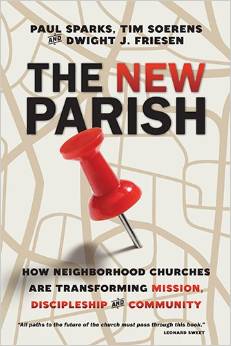Paul Sparks, Tim Soerens and Dwight Friesen have recently released their new book, “The New Parish.”
Parish… really? Why are these three, by all accounts intelligent and insightful writers, dragging out this long-ago-discarded, dusty antique of Christendom? Today, we live in a world of sleek laserjet printers and they want to drag a Heidelberg Windmill Letterpress out of great-grandpa’s storage shed.
It has become cliché to pontificate about the dubious future of the North American church. One only needs to drive the streets of Anytown, USA, on a Sunday morning to witness the locked chapel doors or dwindling congregations.
It has been decades since the American church was defined by denominationalism. I can’t tell you the last time I heard someone come to a new town and say, “There is no need for me to church shop. I only go to the First Metho-bap-terian church.”
It has been decades since the American church was defined by denominationalism. I can’t tell you the last time I heard someone come to a new town and say, “There is no need for me to church shop. I only go to the First Metho-bap-terian church.”
In the wake of post-denominational religion, I believe we need to soberly discuss the organizing model of the churches of today and our hopes for the churches of tomorrow. An organizing principle is simply the governing philosophy that holds a group of people together.
The core-organizing model can be as simple as a dominant personality that everyone identifies with. (For instance, if the pastor is talked about as much as the community, than he/she is probably the core unifying factor.) Other churches are organized around an extreme theological model (e.g. Neo-Reformed) or social agenda (“We are an ‘open-church’”). Whatever that foundational principle happens to be, it will strongly affect most every aspect of a community.
Into this unruly (and often unspoken) cacophony of organizational values, walk Sparks, Soerens and Friesen, dragging their ecclesial-antique. And yet, Walter Brueggemann comments…
Teeming with fresh ideas and rich energy for the future of the church… This is hands-on missional ecclesiology in its most generative mode.
What did he say?
In a society that has little regard for things more than 15 minutes old, Brueggemann believes a discussion of Parish church organization is “fresh”, “rich” and “most generative.” And he is right.
“The New Parish: How Neighborhood Churches are Transforming Mission, Discipleship and Community” is a prophetic work which calls for a church organizational model that visibly counters many of our culture’s addictions, like individualism, commuterism and consumerism. It is a call to a rooted church, which lives out the drama of the Kingdom of God together within a specific and definable geographic space (one neighborhood). This book calls faith-communities of networked friends to break from fragmentation and live an integrated experience where the layered modalities of life intertwine: work and home, recreation and education, volunteerism and entertainment. Phyllis Tickle says of the book…
… hands down, one of the most sensible and simultaneously exhilarating books I have read in a long time.
“The New Parish” is written by practitioners. It is too easy to discuss the nature and work of the Christian church in the realm of lofty ideals and disconnected theory. Sparks, Soerens and Friesen have filled their pages with real examples, practical applications and, best of all, stories.
They dare to suggest that the life and mission of the church is meant to be found in all realms of life and that those realms can, ever-increasingly, be experienced together as a faith-community.
They dare to suggest that the life and mission of the church is meant to be found in all realms of life and that those realms can, ever-increasingly, be experienced together as a faith-community. They offer specific suggestions on place-making, stability, integration and interpersonal transformation as the sent people of God. Jonathan Wilson Hartgrove writes…
What a gift the notion of the parish is for our time. And what a joy to know this collective that’s figuring out how to breath life into this ancient notion.
It appears that these three writer-practitioners may have found quite a treasure in great-grandpa’s storage shed.
Truth be told, a Heidelberg Windmill Letterpress requires more careful attention and weekly maintenance than a sleek laserjet printer from Office Depot. It will also be acquired at a much higher cost. However, while our landfills are full of castoff home printers, many of which were manufactured only a few short years ago, thousands of century-old Heidelbergs are still operational today.
It is also worth noting that a Heidelberg is used for the most meaningful aspects of life: invitations, wedding bulletins and birth announcements, and when you receive one of these Heidelberg treasures, with its raised letters and carefully crafted script on cotton-flecked paper, it will never be dismissively tossed into the nearest recycle bin. Instead, you will place it on display, somewhere that all your friends and neighbors will be able to see.
God is not inviting his people into a disposable life, a fragmented life or an uprooted life. “The New Parish” suggests that the neighborhood might be God’s gift to us, teaching us to live meaningfully, generously, integrated and whole.

